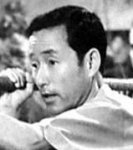
Born in Korea in 1928. After a harsh apprenticeship with director Choi In-Kyu, Chung Chang-Wha turns to his businessman father to fund his first movie The last temptation in 1953. None of his ensuing movies catches any particular attention until the release of Sunny Fields in 1960, an action film for which he experiments editing techniques, short takes and multiple camera angles. Action would lead the rest of his career through crimes (A Bonanza, 1961), historical dramas (Jang Hee Bin, 1961 ; The Story of Janghwa and Hongryun, 1962), and war films (Sunset on the Sarbin River, 1965 ; one of Chungís favourite).
Run run Shaw hires him after having been impressed by location-shot Hong Kong chase scenes of Special Agent X7 (1968), and he so becomes the only Korean director to have ever signed with the Shaw Bros. He therefore shoots modern action pieces (starting with Temptress of a Thousand Faces, in 1969), something his Hong Kong counterparts were apparently incapable of. Also greatly inspired by Chinese history and literature, he starts shooting a number of wu xia pian, enjoying a successful partnership with Actor Lo Lieh. Ironically, it is him of all his fellow moviemakers at Shaw Bros. who was to hit the US and European movie market with Five Fingers of Death in 1973.
After a dramatic exit from Shaw Bros. caused by a disagreement about costumes and equipment standards, he joins Raymond Chow at newly founded Golden Harvest Studios, where he regularly teams up with rising action director Sammo Hung, and hits the Hong Kong Box Office with Skyhawk in 1974, which stars Kwan Tak Hing in one of his last performances as the popular Wong Fei Hung.
After being begged by the then Korean Minister of Culture Kim Seong-Jin to put his directorial talents towards Korean Cinema, Chung Chang-Wha agrees to open a production company in his homeland in return for a filmmaking permit. There, he focuses on production thoughout the 1980s.
He is one of Pusanís Festival special guest in 2003 and in July 2004, he offers the parisian public the chance to pay their respects to one of Asian cinemaís major figures alive.
VincentP

 buy his/her movies
buy his/her movies  info
info
 plus
plus